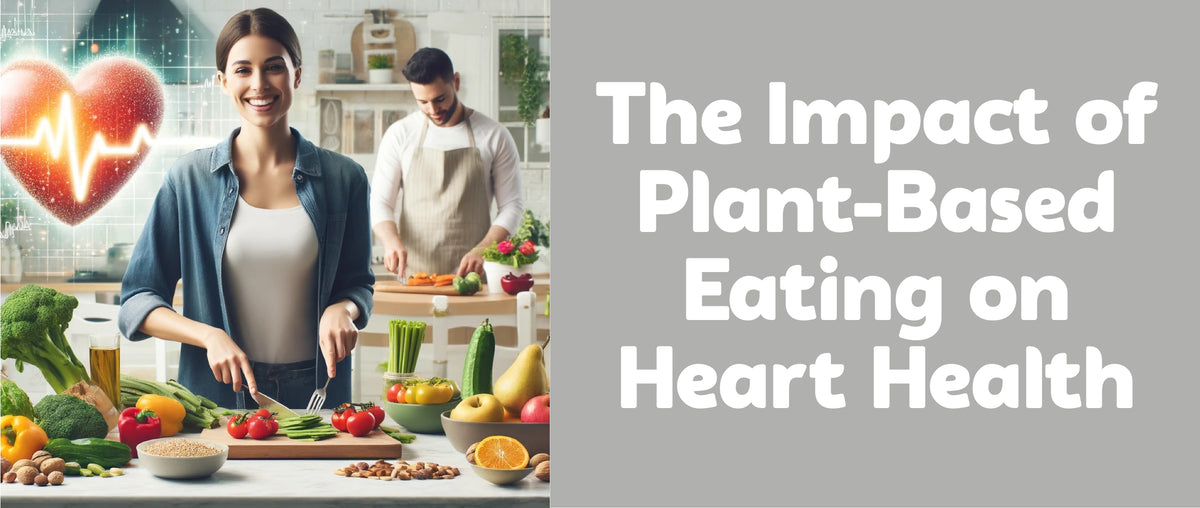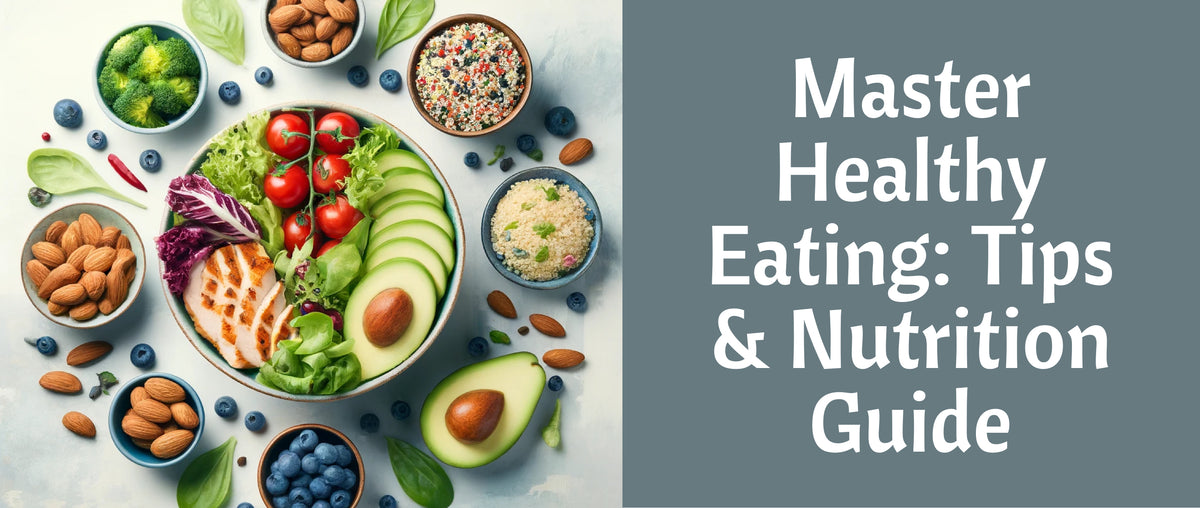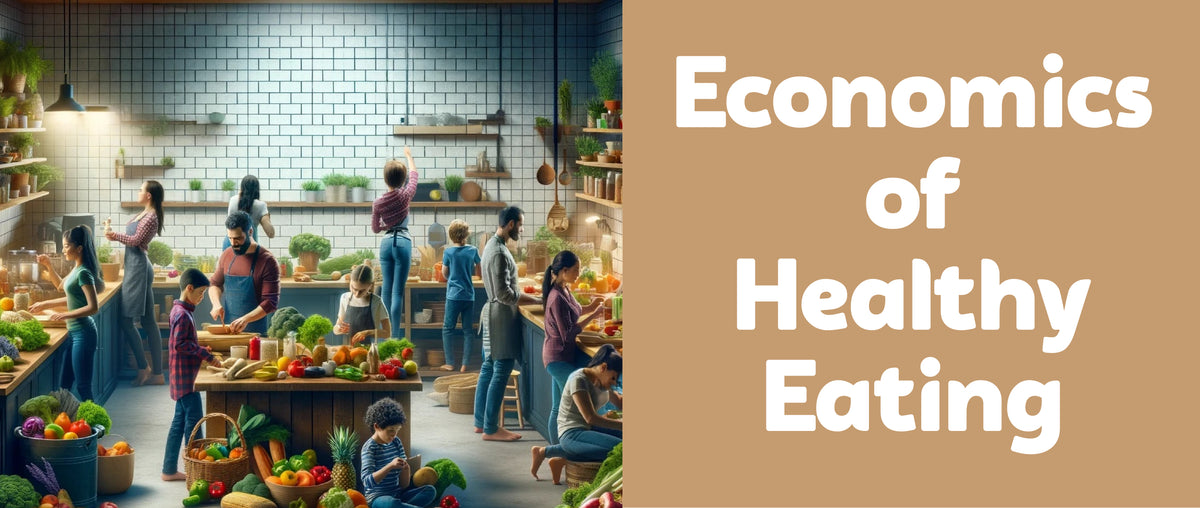The Impact of Plant Based Eating on Heart Health
In recent years, the popularity of plant based diet has soared, driven by concerns for both personal health and the environment. Among the many touted benefits of this dietary choice, its potential to positively influence heart health stands out prominently. Let's delve into the wealth of evidence and recent developments surrounding the impact of plant based eating on cardiovascular health.
Plant-Based Diet and Its Effect on Cardiovascular Disease:
Research indicates that adopting a plant-based diet can significantly lower the risk of cardiovascular diseases. By focusing on whole grains, fruits, vegetables, nuts, and seeds while minimizing or eliminating animal products, individuals can reduce their blood pressure, cholesterol levels, and body weight – all key factors in preventing heart disease.
Plant-Based Diets and Cardiovascular Health:
Studies have consistently shown the positive correlation between plant-based diets and cardiovascular health. By incorporating more plant-based foods and reducing intake of processed and high-fat foods, individuals can improve their heart health and overall well-being.
Plant-Based Diet for Heart Health:
For those already managing heart disease, adopting a plant-based diet can be particularly beneficial. Research suggests that such diets may not only help in preventing heart disease but also in managing existing conditions by improving various markers of cardiovascular health.

Should I Switch to a Plant-Based Diet?
Considering the evidence, many individuals might wonder if they should make the switch to a plant-based diet. The answer largely depends on individual preferences, health goals, and lifestyle factors. However, the overwhelming evidence supporting the health benefits of plant based foods, particularly for heart health, suggests it's a change worth considering.
Recent Developments:
1. How Healthy Are Vegan Ready Meals?: As the demand for convenient plant-based options grows, questions arise about the healthiness of vegan ready meals. While they offer convenience, consumers should pay attention to nutritional labels and opt for options with whole food ingredients and minimal processing.
2. Council Wants to Only Serve Vegan Food at Events: Some local councils have begun advocating for serving only vegan food at public events. This move reflects a broader shift towards promoting plant-based diets for health and environmental reasons.
3. Students Vote to Move to Fully Plant-Based Catering: Universities and schools are increasingly responding to student demands for more plant-based options by transitioning to fully plant-based catering services. This reflects a growing awareness among young people about the health and environmental benefits of plant-based diets.
4. Heritage Panel Recognises City as Home of Veganism: In a significant acknowledgment, a heritage panel has recognized a city as the home of veganism, highlighting the cultural significance and growing acceptance of plant-based lifestyles.
5. Double Risk of Early Heart Disease Death in Resort: Conversely, in areas where plant-based options are limited, such as resorts focused on indulgent dining experiences, individuals may face a higher risk of early heart disease death due to excessive consumption of animal products and processed foods.
Healthy Eating Tips:
- Weight Gain Diet Plan: While plant-based diets are often associated with weight loss, it's important to note that they can also be tailored to support weight gain, particularly by incorporating calorie-dense foods like nuts, seeds, avocados, and whole grains.
- Healthy Eating: Emphasizing whole, minimally processed foods such as fruits, vegetables, whole grains, legumes, nuts, and seeds is key to maintaining a healthy plant-based diet.
- Best Foods for Weight Loss: Certain plant-based foods, such as leafy greens, berries, and cruciferous vegetables, are particularly beneficial for weight loss due to their high fiber and low calorie content.
- Muscle Recovery: Plant-based sources of protein, such as beans, lentils, tofu, tempeh, and seitan, can aid in muscle recovery after exercise, supporting overall fitness and well-being.
- Healthy Snacks for Kids: Encouraging children to snack on nutritious options like fruits, vegetables, whole grain crackers, and nut butter can promote healthy eating habits from a young age.
- healthy diet: A well-balanced plant-based diet that includes a variety of nutrient-rich foods is essential for maintaining overall health and reducing the risk of chronic diseases.
- Kombucha : This fermented tea beverage offers probiotics that can support gut health, which is an important aspect of overall well-being.
- Healthy Drinks: In addition to water, plant-based milk alternatives like almond milk, soy milk, and oat milk provide calcium and other essential nutrients without the saturated fat and cholesterol found in dairy products.
- Vegan Cheese: While traditional cheese is high in saturated fat and sodium, vegan cheese made from nuts, seeds, or plant oils offers a healthier alternative for those following a plant-based diet.
- High Protein Snacks: Plant-based protein sources such as edamame, chickpeas, hummus, and chia seeds make excellent high-protein snacks to fuel energy levels and support muscle repair and growth.
- Low Calorie Food: Many plant-based foods, such as leafy greens, non-starchy vegetables, and fruits, are naturally low in calories, making them ideal choices for weight management and overall health.
- Plant-Based Diet: By centering meals around plant foods and minimizing or eliminating animal products, individuals can reap the numerous health benefits associated with a plant-based diet, including improved heart health and reduced risk of chronic diseases.
- Best Foods for Weight Loss: Incorporating nutrient-dense, high-fiber foods like beans, lentils, quinoa, and leafy greens into meals can promote satiety and support weight loss goals while ensuring adequate nutrition.
Exploring a Plant-Based Lifestyle:
Transitioning to a plant-based diet can seem daunting at first, but it's a journey that offers numerous rewards. Here are some practical steps to help you embrace plant-based eating and reap its benefits for heart health:
1. Start Slowly: If you're new to plant-based eating, don't feel pressured to make drastic changes overnight. Begin by incorporating more plant-based meals into your weekly menu and gradually increasing their frequency over time.
2. Experiment with New Foods: Explore the wide variety of plant-based foods available, from colorful fruits and vegetables to hearty legumes and whole grains. Trying new recipes and ingredients can keep your meals exciting and satisfying.
3. Focus on Whole Foods: Emphasize whole, minimally processed foods in your plant-based diet, such as fruits, vegetables, whole grains, legumes, nuts, and seeds. These nutrient-rich foods provide essential vitamins, minerals, and antioxidants that support heart health.
4. Get Creative in the Kitchen: Experiment with different cooking methods and flavor combinations to create delicious plant-based meals. Whether you're baking, sautéing, grilling, or blending, there are countless ways to elevate the flavors of plant-based ingredients.
5. Stay Informed: Keep up-to-date with the latest research and resources on plant-based nutrition and heart health. Websites, books, documentaries, and online communities can provide valuable information and support as you navigate your plant-based journey.
6. Listen to Your Body: Pay attention to how different foods make you feel and adjust your diet accordingly. Everyone's nutritional needs are unique, so trust your instincts and prioritize foods that nourish your body and support your overall well-being.
7. Seek Support: Surround yourself with supportive friends, family members, or online communities who share your enthusiasm for plant-based eating. Connecting with like-minded individuals can provide encouragement, inspiration, and practical tips for success.
Embracing a Heart-Healthy Future:
Incorporating plant-based eating into your lifestyle is not just a dietary choice—it's a powerful step towards prioritizing your heart health and overall well-being. By nourishing your body with nutrient-rich plant foods and making conscious food choices, you can enjoy a healthier, happier life while reducing your risk of cardiovascular diseases.
Remember, every plant-based meal you enjoy is a step towards a brighter, more sustainable future—for yourself, for your loved ones, and for the planet. So, why wait? Start your plant-based journey today and discover the countless benefits it has to offer for your heart, your health, and your happiness.
Sustainability and the Planet:
Beyond personal health benefits, embracing a plant-based diet also contributes to environmental sustainability. Plant-based foods generally have a lower environmental footprint compared to animal products, requiring fewer resources like land, water, and energy to produce. By choosing plant-based options, you're not only nurturing your own health but also supporting a more sustainable food system for future generations.
Mindful Eating for Heart Health:
In addition to adopting a plant-based diet, practicing mindful eating can further support your heart health journey. Mindful eating involves paying attention to the sensory experience of eating, such as the taste, texture, and aroma of food, as well as recognizing hunger and fullness cues. By eating mindfully, you can foster a healthier relationship with food, prevent overeating, and make more conscious food choices that nourish your body and soul.
Celebrating Progress, Not Perfection:
As you embark on your plant-based journey for heart health, remember that progress is more important than perfection. It's okay to indulge in occasional treats or to navigate challenges along the way. What matters most is the overall pattern of your dietary choices and your commitment to prioritizing your heart health.
Conclusion:
In conclusion, the impact of plant-based eating on heart health is profound and far-reaching. By embracing a plant-based diet rich in whole, nutrient-dense foods, you can nourish your heart, body, and soul while contributing to a more sustainable future for the planet.
So, whether you're enjoying a colorful salad, sipping on a nourishing smoothie, or savoring a hearty plant-based meal with loved ones, know that every bite you take is a step towards a healthier, happier you. Here's to your heart health, today and always.
Do you enjoy vegan food? We have a list of vegan restaurants in India to help you find delicious options in your area!










